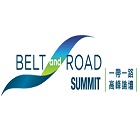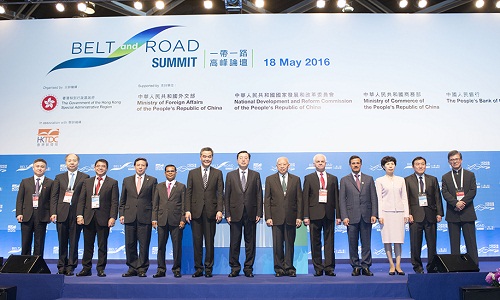"Hong Kong recently hosted the inaugural Belt and Road Summit to explore business opportunities presented to the world by the Belt and Road Initiative. Held at the Hong Kong Convention and Exhibition Centre, more than 20 senior government ministers from countries located along the Belt and Road routes as well as business leaders from Hong Kong, the Chinese mainland, ASEAN and other regions shared their insights on a wide range of issues."

Hong Kong recently hosted the inaugural Belt and Road Summit to explore business opportunities presented to the world by the Belt and Road Initiative. Held at the Hong Kong Convention and Exhibition Centre, more than 20 senior government ministers from countries located along the Belt and Road routes as well as business leaders from Hong Kong, the Chinese mainland, ASEAN and other regions shared their insights on a wide range of issues. The high-level event welcomed more than 2,400 participants, including investors, project owners and services professionals.
The event was organised by the Hong Kong Special Administrative Region Government (HKSARG), supported by the People’s Republic of China’s Ministry of Foreign Affairs, National Development and Reform Commission and Ministry of Commerce, and the People’s Bank of China, in association with the Hong Kong Trade Development Council (HKTDC).

In his welcome remarks, HKTDC Chairman Vincent HS Lo said that the Hong Kong Trade Development Council has been promoting the city as an integrator that brings together governments, capital and expertise to maximize Belt and Road opportunities.
Policy coordination, sector cooperation and ASEAN development
There were three panel sessions. The first panel, chaired by Laura Cha, Chairman of Hong Kong’s Financial Services Development Council, analysed investment opportunities from policy makers’ perspective. The panellists shared their views on how governments can develop their own policies and work with other countries to facilitate cooperation. The speakers included HE Eng Sultan Saeed AlMansoori, Minister of Economy, the United Arab Emirates; HE Ong Ka Chuan, Second Minister of International Trade and Industry, Malaysia; Franky Sibarani, Chairman, Indonesia Investment Coordinating Board (BKPM); and the Hon Gregory So, Secretary for Commerce and Economic Development, HKSAR.
Addressing the topic, ‘Enhancing cross-sector connectivity among economies along the Belt and Road is a major goal of the Initiative,’ the second panel presented influential business leaders offering their insights into closer cooperation between different sectors within the Belt and Road framework. Putting forth their views were: Victor Fung, Group Chairman, Fung Group (Panel Chair); HE Sultan Ahmed Bin Sulayem, Group Chairman and Chief Executive Officer, DP World; Douglas Flint, Group Chairman, HSBC Holdings plc; Dr DJ Pandian, Vice President and Chief Investment Officer, Asian Infrastructure Investment Bank; Lin Jingzhen, Deputy Chief Executive, Bank of China (Hong Kong) Limited; and Professor the Hon KC Chan, Secretary for Financial Services and the Treasury, HKSAR.
The third panel examined the importance of closer business partnerships and the crucial role of ASEAN in the Belt and Road Initiative. The panel was chaired by Kevin Sneader, Chairman, Asia, McKinsey & Company and featured ASEAN business elites, including, Narong Chearavanont, Vice Chairman, Charoen Pokphand Group; Suryo Bambang Sulisto, Chairman, KADIN Indonesia Honorary Council and Founder, PT Satmarindo Group; Teresita Sy-Coson, Vice Chairperson, SM Investments Corporation; Tan Sri Dr Francis Yeoh Sock Ping, Managing Director, YTL Group; and Dr Jonathan Choi, Chairman, Sunwah Group.
Investment opportunities
Hon John Tsang, Financial Secretary of the HKSAR, delivered opening remarks during the keynote luncheon and Han Weiqiang, Chairman of the Supervisory Committee of China International Capital Corporation, introduced the keynote speaker Jin Qi, Chairman of the Silk Road Fund. The $40 billion Silk Road Fund was established to help finance the Belt and Road Initiative, mainly in infrastructure and resources, as well as projects related to industrial and financial cooperation. Jin said that Hong Kong can facilitate communications and connections among Belt and Road countries, and can provide an ideal platform for financing and asset management.
At the Dialogue on ‘The Way Forward,’ HKTDC Chairman Lo shared the stage with Wang Zhan, President of the Shanghai Academy of Social Sciences and Executive Vice President of Yangtze Council. The dialogue delved more deeply into the next steps for the Initiative and explored how businesses can plan strategically to prepare themselves for the Belt and Road opportunities ahead. During the Dialogue, Chen Dongsheng, President of China Entrepreneurs Forum announced the setting up of a Belt and Road fund in Hong Kong to capitalise on the opportunities.
Tangible steps forward The summit offered opportunities for effective networking and business matching through its Business Matching Workshops, exhibition and infrastructure display while a side-trip to some of the mainland’s Free Trade Zones. The workshops, under the themes: infrastructure, urbanisation and utilities, gathered investors, project owners and services professionals to build business partnerships through networking and business matching. An exhibition was also staged, with 27 Hong Kong services providers showcasing their expertise in banking and financial services, infrastructural development and professional services. At the Global Investment Zone, 10 countries introduced their investment projects to international investors.
In collaboration with the Association of Architectural Practices (AAP) and Association of Consulting Engineers of Hong Kong (ACEHK), the HKTDC mounted a signature display of around 145 infrastructure projects in Hong Kong, showcasing the city’s infrastructure and real estate-related services.
The event was organised by the Hong Kong Special Administrative Region Government (HKSARG), supported by the People’s Republic of China’s Ministry of Foreign Affairs, National Development and Reform Commission and Ministry of Commerce, and the People’s Bank of China, in association with HKTDC.












